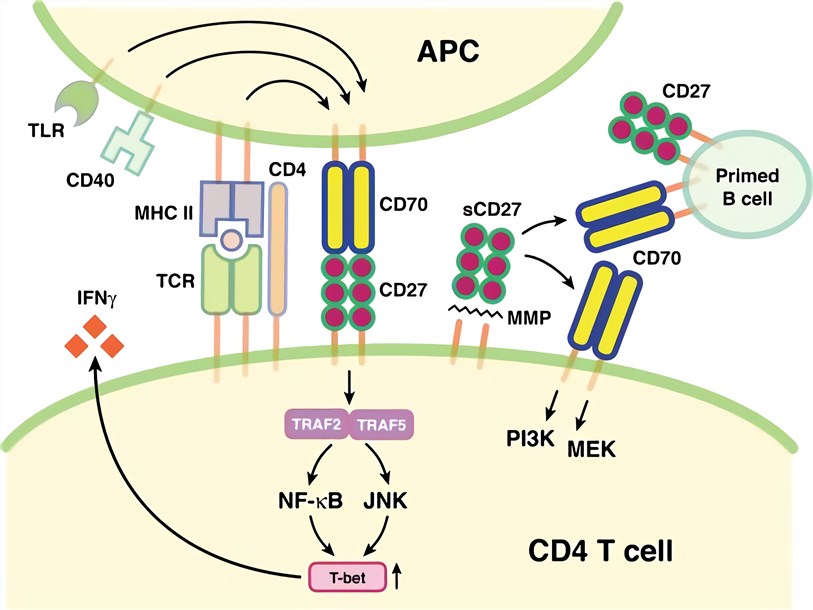CD27 is expressed as a transmembrane homodimer with subunits of 55 kDa, which in humans, can generate a soluble form (sCD27) by matrix metalloproteinase (MMP) cleavage after T cell activation. CD27 is a receptor of the tumor necrosis factor (TNF) superfamily, constitutively expressed on the surface of progenitor and naive T-cells, as well as subsets of NK cell, dendritic cells and B cells and also weakly on activated macrophages. Generally, CD27 is not expressed by naive B lymphocytes but is upregulated in activated and antigen-experienced B lymphocytes. CD27 is a tightly regulated costimulatory molecule, activated through its unique ligand CD70, enabling activation of innate and adaptive immunity.
 Fig.1 CD27-CD70 pathway in immune regulation. (Han, 2016)
Fig.1 CD27-CD70 pathway in immune regulation. (Han, 2016)
In mature dendritic cells, CD70 expression is upregulated upon triggering of CD40 or Toll-like receptors, ensuring optimal T cell stimulation. The ligation CD27 and CD70 provide co-stimulatory signals through the NF-kappa B (NFκB) and c-Jun N-terminal kinase (JNK) pathways via TNF receptor-associated factor (TRAF2 and TRAF5). CD27 triggering contributes to the formation of the effector T cell pool by efficient priming of T cells and the subsequent promotion of T cell survival. CD27-CD70 interactions were shown to induce proliferation and cytokine production by both CD4+ and CD8+ T cells and promote the development of cytotoxic T cell responses. CD70-CD27 can enhance T helper cell 1 (TH1) cell differentiation but inhibit Th17 and regulatory T cell (Treg) effector cell differentiation. Besides its effect on T cell development, CD27 is upregulated on B cells through antigen receptor triggering and is maintained after activation, making it a typical marker for memory B cells. Even though triggering of the CD70/CD27 axis stimulates immunoglobulin production by the promotion of plasma cell differentiation, CD27 is not absolutely required for adequate B cell responses. In addition, CD27 is highly regulated on NK cells, the key mediators of the innate immune defense mechanism.
Many of the hematopoietic lineage tumors express CD27, which might implicate a possible role for CD27-CD70 interactions in the regulation of tumor cell expansion and survival. Co-expression of CD27-CD70 was found on a high proportion of leukemic cells in acute lymphoblastic lymphoma samples. In the tumor microenvironment, persistent CD27 signaling can occur through the expression of CD27 on tumor-infiltrating lymphocytes which have been shown to communicate with CD70+ carcinoma cells. The sCD27 has also been linked to poor outcomes in various hematological malignancies. Elevated serum concentrations of sCD27 were also found in patients with acute lymphoblastic leukemia, chronic lymphocytic leukemia and large B cell lymphoma, predicting poor outcome in the latter and correlating with CD27 expression on lymphoma cells. CD27-expressing tumor cells in solid malignancies have not been demonstrated to date. Notably, sCD27 did show potential as a prognostic marker in non-small cell lung cancer whereby elevated sCD27 levels correlated with reduced overall survival and progression-free survival.
Through the constitutive expression of CD70 on tumor cells, persistent signaling of CD27 in the tumor microenvironment has been shown, mediating immune escape by T cell apoptosis, T cell exhaustion and Treg survival. Due to these potent co-stimulatory effects, there is a great interest in manipulating CD27 co-stimulation for immunotherapy. Creative Biolabs provides a full set of CD27 assay portfolio services, such as flow cytometry and cell sorting assays, cell proliferation assay (e.g. BrdU, EDU, CCK8), apoptosis assay, T Cell activation, proliferation and differentiation assays, ELISA, immunoblotting, immunoprecipitation and so on.
As one of the top biotechnological companies, Creative Biolabs has created a one-stop tumor marker assay services for our global customers. Our focus has always been on building long-term relationships and being a true partner of your research. Creative Biolabs provides direct biotechnological support, please feel free to contact us.
Reference
For Research Use Only | Not For Clinical Use